Security Guard Services

In its simplest form, a security guard is someone employed by an employer or government agency to protect an employing entity's assets (including personnel, property, equipment, money, and so on.) A more encompassing definition of the term security guard entails the representation of that position to the public and is required to conduct the duties at the directions of the employing entity. Security officers are expected to have a proven skill set with firearms, street smarts, emergency medical skills, and knowledge of appropriate law. Most security guards have performed many years of service in various law enforcement agencies, the military, or security consulting businesses. Some security officers also go on to work independently as private investigators, bounty hunters, or consultants. If you want to know more about Security guard license Ontario, visit this page.
Some specific positions that might be required of security guards include body guards, courthouse security, courthouse guards, escort/security, and corporate security. Some security officers may also provide routine or contract services outside the workplace, as well as contract-specific services for corporations. For example, some corporations hire contract body guards to watch over the premises when company executives are on extended business travel. Similarly, security guards may also be employed to protect company assets at the home or office of an individual, as long as the employed security personnel have the consent of the home or business owner.
Certain professional organizations offer Security guard training in basic first aid, police tactics, weapons usage, and more. Today, there is an abundance of Internet based resources that can assist aspiring security guards in becoming licensed and certified in these areas. Becoming a certified safety officer requires at least a bachelor's degree in safety, law enforcement or a related field. Many universities and colleges also offer certificates in combination security field programs, which allow students to continue their education while earning a second certification.
Most private security companies require potential guards to undergo thorough background checks. Security firms look for people who appear to have clean records, as well as neighbors and friends who may recommend them. Security officers may work for a privately owned company or for a larger government agency. Private security officers may work for corporations, though they are usually not employed exclusively. Many security officers work in conjunction with the military, both in an administrative capacity and in combat situations, although most security officers are employed exclusively for emergency services.
In most states, it is against the law for an unauthorized individual to be in possession of a firearm unless the weapon is in the individual's permanent residence. In addition, most states prohibit security officers from transporting firearms in any vehicle. Additionally, it is illegal to possess an automatic sales device that will reset the features on a cellular phone or a pager. As well, unauthorized individuals are generally prohibited from possessing a stun gun or TASER device.
The majority of security guards are temporary employees who are employed to observe the premises while the owner or manager is away. They are also responsible for keeping the building, grounds, and property in a sanitary condition. If caught, they may be arrested and prosecuted for trespassing, since their trespassing allows them to breach the peace and privacy of others. Security personnel are most often required to work late nights, weekends, and holidays. Most security guards are on call 24 hours a day. When needed, they are usually called out even if it's not an emergency. Read more details related to this topic on this link: https://en.wikipedia.org/wiki/Security_police.
